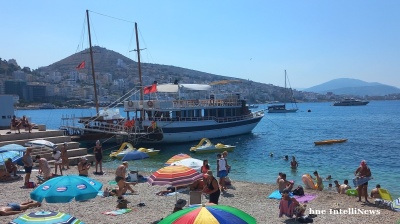The global crisis has caused an all-time record $83bn to flee emerging markets, but for the poorest countries the problem is not investors making for the door – they never had that many in the first place – but the sudden halt to the cash their migrant workers are sending home to their families. In some countries remittances make up as much as a third of GDP.
If you are a young Tajik, Uzbek, Ukrainian or even Romanian, then the poor pay at home often means you have left the country to look for work elsewhere. Some 5mn Ukrainians have left the country in recent years and headed for the labour markets of Poland, amongst other places, where they can earn four times more than they can at home. The fields of western Europe are filled with Romanian labour every year, while the construction sites of Russia and the taxis on the road team with migrants from Central Asia and the Caucasus.
Many counties of Central Europe have become dependent on these migrant workers to provide the cheap labour they need after a five-year long boom, as they were increasingly facing a labour shortage. However, as the pandemic has grown many of the workers have gone home to sit out the global lockdown. Already farmers in places such as Poland are in talks with the government to fly in thousands of labourers from Eastern Europe to prevent fruit and veg from rotting in the field.
Many more of these casual workers have just lost their jobs. The money they send home every month usually supports large extended families and accounts for a significant share of GDP in many countries. The poorest countries were already the most vulnerable to the current crisis but a collapse of their remittance inflows is going to make things a lot worse by causing a balance of payments crisis.
And remittances are going to take a double whammy, as not only are the big economies like Poland and Russia very reliant on this cheap supply of labour, but the oil exporting countries make up a disproportional share of migrant workers.
“Everyone is forecasting large recessions in the US, Europe and oil exporters. But these are the countries that account for the bulk of global flows in remittances,” says Elina Ribakova, deputy chief economist for the Institute of International Finance (IIF). “Oil exporters account for fifth of global remittances. So the oil price war and the dramatic collapse in demand mean recessions. You can see what happened to outflows from Russia during the 2014 shock and this is likely to happen to others now.”

Remittances are most important for the very poorest countries. In both Tajikistan and Kyrgyzstan remittances account for just under 30% of GDP, amongst the highest in the world, followed by Moldova with 15.2%. Ukraine remittances made up 11.8% of GDP in 2019 and remittances in Armenia, Montenegro and Albania all make up about 10% of GDP.
Ukraine is currently running a balance of trade deficit of around $6bn, as it imports roughly $2bn worth of goods more than it exports to both Russia and the EU as well as running deficits with several other large trade partners.
But the country’s current account has been in surplus or in deficit to the tune of a very modest $500mn-$600mn for most of 2019 thanks to the approximately $12bn a year migrant workers have been sending home – enough to comfortably cover the bulk of the trade balance shortfall.
It is not clear what affect the stop-shock is going to have on remittances but if they were to halve in Ukraine’s case, that could blow a $6bn hole in its balance of payments that would put its already thin resources under a great deal more pressure. The government is already going to struggle to pay the $4.1bn of debt that matures this year without a new IMF deal.

Features

Kazakhstan defies global FDI downturn as investors target new sectors
Renewables, agribusiness, data centres and advanced manufacturing among new magnets for investment sitting alongside oil, gas and mining.
_1762193126.jpg)
Is Venezuela's resource wealth Trump's real target?
As US military forces mass in the Caribbean, Venezuela's oil and mineral wealth emerges as a potential prize in a looming confrontation that will likely result in the ousting of President Nicolas Maduro.

The US now sees China as an equal - it is time for Western media to wake up and do the same
China was long filed under “too foreign, too dangerous, too different” in many Western newsrooms. Not anymore. Beijing is now impossible to ignore as American leaders have realised. Western media outlets need to wake up to this reality too.

COMMENT: China’s latest economic conquest – Central Asia
For the five Central Asian republics - Kazakhstan, Kyrgyzstan, Tajikistan, Turkmenistan and Uzbekistan - China has in recent years emerged not only as a dominant trading partner, but increasingly as the only partner nearby that can actually deliver.




